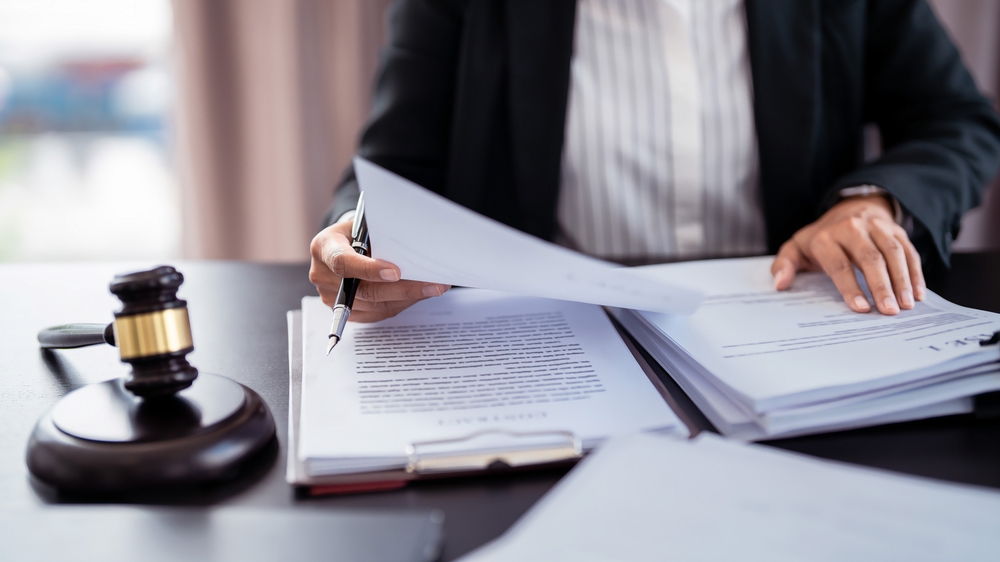Personal injury lawsuits arise when someone suffers injuries due to another party's negligence or wrongful actions. Proving liability, gathering evidence, interviewing witnesses, and establishing a causal link between the defendant's actions and the plaintiff's injuries are all necessary as part of a lawsuit.
On top of the legal requirements, you are hurting physically and psychologically and likely have little experience negotiating with insurance companies or legal professionals. To ensure a fair settlement, you’ll want to hire an experienced Ontario personal injury attorney you can trust to have your back. If you have questions, a personal injury attorney is ready to schedule a free consultation and provide answers.
Personal Injury Claim vs. Personal Injury Lawsuit

A personal injury claim refers to the initial step where an injured party, the plaintiff, seeks compensation from the at-fault party, the defendant, or their insurance company. This claim is typically filed with the defendant's insurance company and aims to settle without the need for a lawsuit. However, if a fair settlement cannot be reached through negotiation, the injured party can file a personal injury lawsuit.
A personal injury lawsuit is a non-criminal court case or “civil action” initiated by the injured party against the defendant. Going to court is a step your attorney might take when negotiations fail, or the insurance company denies the claim. It allows the injured party to seek compensation via the formal legal system.
Elements Needed to File a Personal Injury Lawsuit
If you decide to file a personal injury lawsuit, there are specific requirements you need to meet:
You are a competent adult
To file a personal injury lawsuit, you must be of legal age and possess the mental and physical capability to handle the legal process. This ensures you understand the implications of the lawsuit and make informed decisions throughout the process. If you are a minor or lack the mental capacity, a legal guardian or representative may be appointed to act on your behalf.
The defendant’s actions directly harmed you
To file a personal injury lawsuit, you must demonstrate that the defendant's actions or inaction directly led to your injury or damages. This requires gathering evidence like medical records, witness testimonies, and other relevant documentation proving the causal link between the defendant's negligence and your injury.
You have legal standing as a business or individual
To file a personal injury lawsuit, you must have legal standing. This means that you have a direct interest in the case and suffered harm for which the law allows you to recover legal relief. You cannot file a personal injury claim for another adult if they can do so themselves. If you aren’t sure about your legal standing, please don’t hesitate to contact a personal injury lawyer with your questions. They are here to help!
What Evidence Is Needed?
Gathering the right evidence helps establish the defendant's negligence and prove the extent of your damages. Here is the evidence you’ll likely need:
- Pay stubs and employment documents: If your injuries have resulted in lost income or a reduced ability to work, providing records of your pay stubs and other employment documents will be key.
- Statements from doctors or mental health counselors: Expert opinions from medical professionals can help establish the seriousness of your injuries and their impact on your physical and mental well-being.
- Medical records: These include documentation of your injuries, treatments received, and any pre-existing conditions that the incident may have aggravated.
- Medical bills or invoices: To prove the financial impact of your injuries, you must provide copies of your medical bills ( for emergency care, hospital stays, surgeries, medications, rehabilitation, medical devices, and physical therapy, among other treatments).
- Statements from friends and family: Testimony from those who have witnessed the consequences of your injuries can add credibility to your case. Talk to colleagues, friends, and family members.
Demanding Compensation

Before proceeding with a personal injury lawsuit, it is customary to send what is known as a demand letter to the defendant or their insurance company. This letter outlines your injuries, damages, and the amount of compensation you are seeking. The demand letter serves as a formal request for fair compensation and provides an opportunity for the defendant or their insurance company to negotiate a settlement without going to court. In some cases, this letter alone can lead to a satisfactory resolution.
Negotiating a Settlement
If the defendant or their insurance company responds to your demand letter and shows willingness to negotiate, your personal injury lawyer will try to reach a just settlement. Settlement negotiations involve back-and-forth discussions to determine an agreed-upon amount of compensation without going to trial.
During negotiations, your personal injury lawyer will advocate for your best interests, considering the extent of your injuries, medical expenses, lost income, and other damages. You’ll want a persuasive negotiator on your side to ensure you receive a fair settlement that adequately covers your losses.
Filing a Lawsuit for Damages
If a fair settlement cannot be reached through negotiation, your attorney can file a lawsuit. This involves drafting a complaint that outlines the details of the incident, the injuries sustained, and the damages you seek. Once they file the lawsuit, the defendant will be formally served with the complaint, and the legal process begins. Filing a lawsuit does not guarantee a trial. Many cases are still settled through negotiation, even after filing a lawsuit.
Determining Jurisdiction
Jurisdiction refers to the specific court or judicial district where your lawsuit should be filed. In general, you must file your lawsuit in the jurisdiction where the incident occurred or where the defendant resides. However, specific rules may apply depending on the nature of your case or the parties involved. If you live far away from where the incident occurred or there are other doubts, don’t hesitate to reach out to a personal injury attorney for answers.
Discovery
Once the lawsuit is underway, the discovery phase begins. Discovery allows both parties to gather evidence and exchange relevant information related to the lawsuit. During discovery, your personal injury attorney can use various methods to obtain information, including written interrogatories, requests for documents, depositions, and requests for admission. This process helps build the factual basis of your case, uncover additional evidence, and evaluate the strength of the defendant's case.
Mediation and Arbitration

In some cases, before proceeding to trial, mediation or arbitration may be alternative dispute resolution methods. These methods involve a neutral third party who facilitates the negotiation process between the parties to reach a settlement or resolution.
Mediation relies on a neutral mediator who helps the parties explore possible solutions and reach a mutually agreeable resolution. Arbitration, on the other hand, is more formal and involves presenting the case to an objective arbitrator who will make a binding decision. Mediation and arbitration are often cost-effective and expedient alternatives to a trial.
Going to Trial
If a fair settlement is not possible through negotiation, mediation, or arbitration, your lawsuit will proceed to trial. Going to trial is a complex process, requiring the representation of a litigator with plenty of courtroom experience. Your lawyer will present your case, cross-examine witnesses, and argue on your behalf to secure the compensation you deserve.
Don’t Forget the Statute of Limitations
The statute of limitations is the legal deadline for filing a personal injury lawsuit. Each state has its own time limits, which vary depending on the type of lawsuit and the state where the incident occurred. Sometimes, your window can be as small as one year from the date of the injury. Children who suffered injuries before their 18th birthday have more time. There are also legal exceptions for those who did not know they suffered an injury, such as people who suffered exposure to toxic chemicals that did not manifest into health problems for years.
Failing to file within the statute of limitations means your lawsuit can be dismissed, preventing you from seeking compensation for your injuries. Talk to a personal injury lawyer right away to get started.
The Compromise of Liens Process
During the course of a personal injury lawsuit, it's not uncommon for various parties, such as healthcare providers or insurance companies, to assert claims against the awarded damages. These financial claims are referred to as liens. An example is your doctor’s office putting a lien on your award to cover the medical bills you have not paid.
The compromise of liens process involves negotiating with these parties to reduce their claims and ensure a fair distribution of the awarded damages. This is yet another reason why having a stellar personal injury lawyer on your side is worth it.
Following Up With Medical Treatments
You must prioritize your medical treatments throughout the personal injury process and follow up with your healthcare providers. This not only ensures your well-being but also strengthens your case. Keeping up with your medical treatments demonstrates that you are taking your recovery seriously and provides updated documentation of your injuries and progress. Failing to follow up with treatments can weaken your case and potentially reduce the amount of compensation you may receive.
What Happens When Your Compensation Check Arrives?
When your compensation check arrives, there is a process before you get your money:
Lawyer fees

Your legal fees will get paid first once your attorney receives your check. Personal injury lawyers work on a contingency basis, meaning they receive a percentage of the awarded damages as their fee. This fee is agreed on before the representation begins.
Costs and expenses
Any costs and expenses incurred during the process of the lawsuit, such as court fees, expert witness fees, outstanding medical bills/liens/reimbursements, and administrative costs, will be deducted from the awarded damages.
The remainder goes to your medical providers, and you
After your legal fees and expenses are paid, the remaining amount will be disbursed to cover your existing medical bills, and you receive the rest. The lawsuit or settlement check does not go straight to you—your lawyer receives it on your behalf and is obligated to pay out expenses before distributing your portion to you.
Personal Injury FAQs
As personal injury attorneys, here are some of the most common questions we hear from accident victims:
Personal Injury Lawyers to Fight for Your Rights
If you have suffered an injury due to someone else's negligence, the sooner you contact a trusted personal injury lawyer in Ontario, the better. To set up a free legal consultation and case review, contact a local law office now.